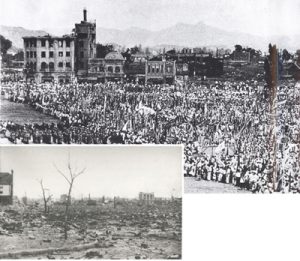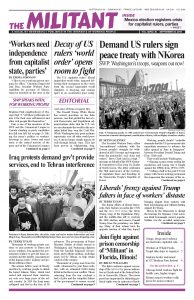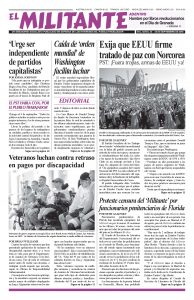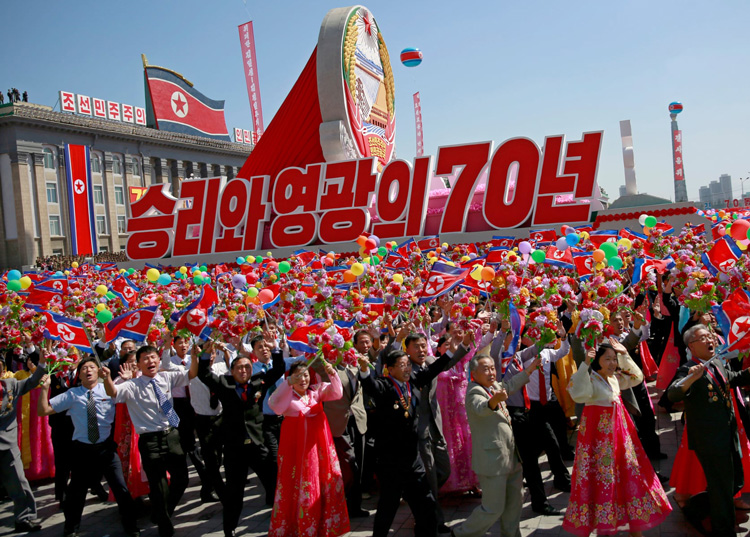The Socialist Workers Party offers “unconditional solidarity with the Korean people’s struggle for withdrawal of all US troops and weaponry from the peninsula’s soil, skies and waters,” Steve Clark said in a Sept. 7 message on behalf of the SWP National Committee to Kim Jong Un, leader of North Korea, on the occasion of the 70th anniversary of the founding of the Democratic People’s Republic of Korea.
Working people should “redouble demands that the US government take immediate measures to advance the talks opened in June in Singapore” between President Donald Trump and Kim, Clark said.
That would include Washington:
- “Signing a peace treaty ending the murderous and losing war it fought against the DPRK from 1950 to 1953;
- “Calling a halt to the joint US war games with Seoul, making permanent the suspension this summer of the so-called Ulchi Freedom Guardian exercises; and
- “Reaching agreement with the DPRK on a Korea free of nuclear weapons, of any origin, and all practical steps to that end.”
Ever since U.S. imperialism’s brutal partition of the peninsula into North and South in 1945, Clark noted, the Socialist Workers Party has championed the Korean people’s efforts to reunify their country.
Since the Singapore summit, the North Korean government has held talks with the government in the South and taken a number of steps that promote reunification. This includes holding a reunion for families in the North and South who had not seen each other since the country was divided, and advancing joint plans to build modern rail and road links between the South and North all the way to the Chinese and Russian borders.
North Korea celebrated the 70th anniversary of the founding of the DPRK Sept. 9 with a large military parade. Pyongyang “notably did not show off the intercontinental ballistic missiles that are thought to be capable of reaching the United States,” the Washington Post reported, as did most of the U.S. press, unlike a military parade there in April 2017.
Instead, the Post noted, the parade “was dedicated to civilian efforts to boost the economy” as well as “reunification of the Korean Peninsula.”
“This is a big and positive statement from North Korea. Thank you to Chairman Kim,” President Trump said in a tweet. “There is nothing like good dialogue from two people that like each other!”
Kim and Trump exchange messages
Kim and South Korean President Moon Jae-in are set to meet in Pyongyang Sept. 18-20 for their third summit this year. Moon’s National Security Adviser Chung Eui-yong met with Kim Sept. 4 to prepare for the summit and delivered a message from Trump to the DPRK.
Kim told Chung that he wants to “fulfill denuclearization” of the Korean Peninsula by the end of Trump’s first term in office. Kim sent a letter to Trump two days later.
Last month Secretary of State Mike Pompeo named former Ford Motor Co. executive Stephen Biegun his special representative for North Korea. The State Department announced Sept. 6 that Biegun will travel to Asia Sept. 10-15 to meet with government officials in Seoul, Tokyo and Beijing.
U.S. Maj. Gen. Michael Minihan, chief of staff for the United Nations Command and U.S. Forces Korea, met with North Korean Lt. Gen. An Ik San Sept. 7 to organize further steps to work together to locate and repatriate the remains of U.S. soldiers missing in action since the Korean War.
U.S. imperialist division of Korea
Korea was ripped in half against the will of the Korean people at the end of World War II, part of a deal between Washington and Moscow. U.S. troops landed in the South in 1945, taking over the role that the hated Japanese imperialist occupation had played for four decades.

Washington installed the dictatorship of Syngman Rhee in the South, and put Korean working people there down in blood as they tried to take advantage of Tokyo’s defeat to advance their fight for national independence and dignity, for land reform, labor rights, women’s suffrage and working people’s control of factories and land.
By July 1950, before the start of the Korean War, more than 100,000 workers, peasants and youth had already been killed by the landlord-capitalist regime and the U.S. occupation army in the South.
The U.S. rulers waged a brutal three-year war against the people of North Korea, dropping 635,000 tons of bombs and over 32,000 tons of napalm and leveling virtually every city there. Then President Harry Truman told the press in November 1950 that Washington was considering invading China and giving “active consideration” to using the atomic bomb.
But they couldn’t break the will of the Korean people. In the first ever military defeat for U.S. imperialism, Korean fighters, with aid from Chinese volunteers, fought the U.S.-led forces to a stalemate. In 1953 the U.S. government agreed to an armistice, ending the fighting, but to this day has refused to sign a peace treaty.
Today the “institutions of the liberal imperialist order imposed by Washington in the aftermath of its victory in World War II” are decaying, Clark pointed out in his message for the SWP National Committee. “That exploitative setup is being pulled apart by the current US administration and by its rival ruling classes across Europe, Russia, China and the Middle East and Asia. The weakening of the US rulers’ seven-decades-long effort to keep its boot on the Korean people’s neck is a welcome aspect of this decay.”
The SWP joins with others around the world, Clark says, to demand, “A nuclear-free Korean Peninsula! End all economic sanctions against the Korean people! Sign a peace treaty with the DPRK now!
“Korea is one!”


